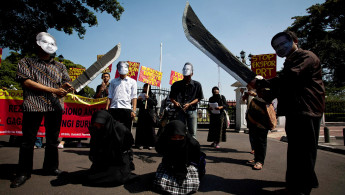Nobel laureates urge Saudi Arabia not to execute 14 Shia activists
Ten Nobel laureates from across the world have penned an open letter urging Saudi Arabian authorities to hold off on the execution of 14 Shias convicted of protest-linked crimes.
Fears are mounting of the imminent mass execution of the 14 Shias convicted of charges linked to protests in 2012, including rioting, theft, armed robbery and armed rebellion.
Amnesty International and Human Rights Watch have accused Saudi authorities of coercing confessions which were later retracted in court and failing to grant fair trials to defendants, including juveniles.
Signed by anti-Apartheid leader Archbishop Desmond Tutu, Yemeni activist Tawakkul Karman, Iranian lawyer Shirin Ebadi and former East Timor president and Nobel laureate Jose Ramos-Horta, the letter released on late Friday urged King Salman and Crown Prince Mohammed bin Salman, his son, to "extend the hand of mercy" and refrain from ratifying the death sentences.
Saudi Arabia has one of the world's highest rates of execution. This year alone, it has so far executed 75 people.
In July, the supreme court upheld the death penalty for the 14 men, all Saudi Arabian nationals. The sentences must be ratified by the king or the crown prince for the executions to go ahead.
The 14 are all linked to protests in Qatif, an eastern province home to most of the Sunni-ruled kingdom's Shia minority, who have long complained of marginalisation.
The east is also the source of most of Saudi Arabia's oil.
Saudi authorities, who have regularly cracked down on protests in Qatif, this week seized control of the town of Awamiya after increasingly frequent clashes between residents and police.
Authorities have said drug traffickers and "terrorists" were behind the unrest in Qatif.





 Follow the Middle East's top stories in English at The New Arab on Google News
Follow the Middle East's top stories in English at The New Arab on Google News
![Israeli forces ordered bombed Gaza's Jabalia, ordering residents to leave [Getty]](/sites/default/files/styles/image_330x185/public/2176418030.jpeg?h=a5f2f23a&itok=_YGZaP1z)

